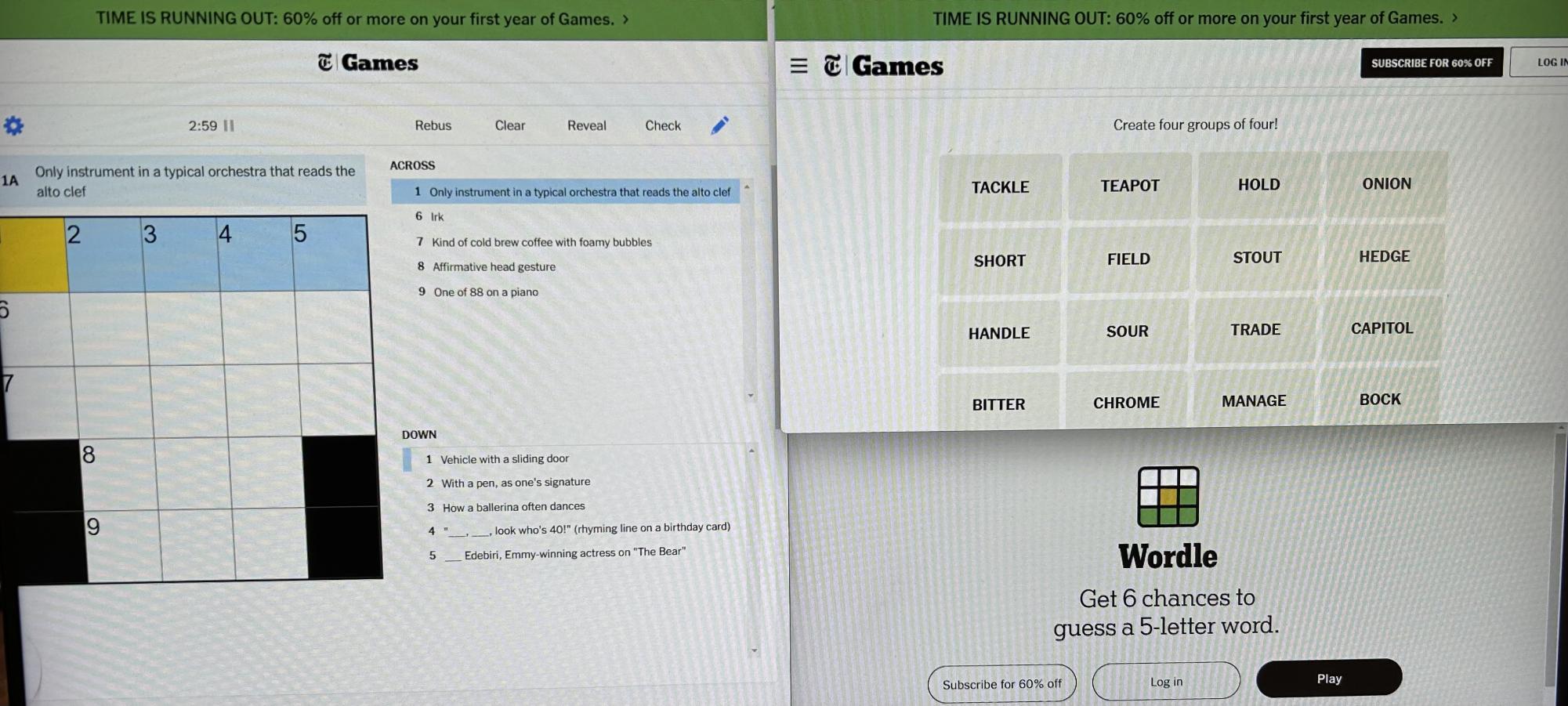Released to the public in 2021, Wordle has become an everyday routine for individuals of all ages, including myself. The simple puzzle–provided by New York Times–offers a daily challenge of deciphering a five letter word and gives visual hints after every guess. Since then, online puzzle teasers have become a sensation, growing popular on social media platforms such as Tiktok and Instagram, and taking form in posts bragging “I solved the Wordle in 3 tries!” or “I got the Mini Crossword in less than a minute!”
As Wordle has grown in familiarity, so have other various mini puzzle games, notably the Wordle spin-offs–Nerdle, Worldle, and Quordle to name a few–and the New York Times Mini Games: Connections, Mini Crossword, Strands, and Spelling Bee. Each and every one of these puzzles are undoubtedly addicting.
It’s unclear to me as to why they are so appealing. Maybe it’s the instant gratification of “you solved it!” that pops up on screen. Maybe it is the fun of a friendly competition in which puzzle-goers compare their best scores. Perhaps it is even a point of pride to be able to brag that you successfully solved the Connections quicker than your best friend or your greatest enemy.
For me, it’s a nice brain game that acts as a break from the monotonous lifestyle that can be high school. Once I am finished with class activities, I often flip open my Chromebook and open up the Wordle, Mini Crossword, and Connections. I must admit that I don’t consider my school day fully productive until I complete my three favorite puzzles. I used to have four favorites–unfortunately, Dowling blocked the website that created my favorite math puzzle: “Nerdle.” When the large error message popped up on my screen last year, I leaned over to my friend and said, “Oh no! They blocked the Nerdle!” My friend laughingly rolled her eyes, and it was at that moment I realized I may just be a nerd(le).
Sure, the popular puzzles bring my peers and me much satisfaction upon completion, but the practice of doing these puzzles has shown to have actual health benefits–especially to teenagers with developing cognitive and behavioral skills. The chief of neurology at Hartford Healthcare considers the NYT games to be a “cognitive workout” (Hartford Healthcare). First of all, the brain teasers increase focus ability–concentrating on one task for a certain amount of time carries over into one’s attention span during class, at work, or just simply in daily tasks. Additionally, the NYT Mini Games further contribute to critical and strategic thinking; that is, problem-solving for a given task and applying the skills and strategies used to future undertakings. Unsurprisingly, the games increase creativity because most are not an analytical or direct task, but rather one that requires thinking outside the box and coming to conclusions based on patterns or deductive reasoning.
While NYT Mini Games certainly improve brain health, the real takeaway comes down to personal enjoyment. A doctor from Hartford Healthcare writes that “how much you benefit from brain games boils down to how much you actually enjoy them.” Basically, if it is distressing and agitating to complete a crossword every day, don’t do it! Your cognitive skills just do not improve by staring at black, jumbled words and stressing over their meaning and application to the crossword! I must say, though, there are NYT Mini Games for individuals of all different skill sets and strengths: from math, to reading, to pattern recognition, to pop culture! So try one out before you just “give up,” I bet you have a talent that you don’t even realize!
So, next time you silently judge your grandma for insisting on completing her level of Candy Crush or the New York Times crossword at every family holiday, just remember: she has cracked the code to staying “brain active” and it’s pretty fun, too!



James Dressen • Dec 20, 2024 at 9:54 am
Outstanding informative article! You have now pulled me into looking into more brain challenges in my mature years. Keep up the great work!